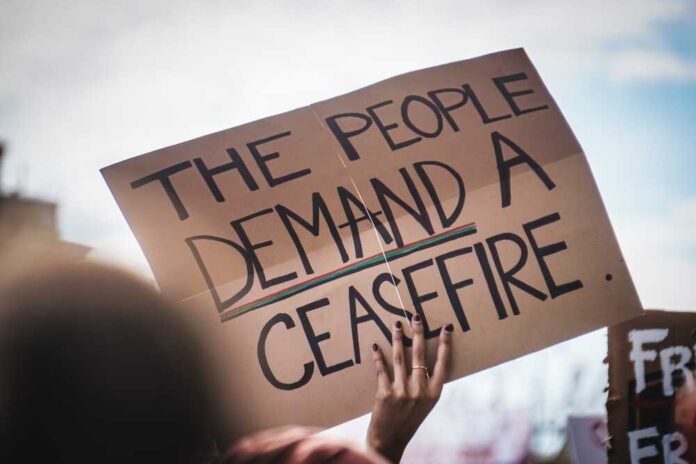
The Venice Biennale is among the most esteemed international art exhibits worldwide. Since February, hundreds of pro-Palestinian demonstrators have attempted, but failed, to have Israel barred from the event because of the war in Gaza.
An activist organization called Art Not Genocide Alliance wrote an open letter in February calling for a ban on Israel’s pavilion due to what it called Israel’s “ongoing atrocities” in Gaza.
The Israeli pavilion will keep its doors locked on Tuesday at the Israeli artist’s request.
The Israeli artist and curators at the Venice Biennale have stated their intention to hold off on opening the Israeli pavilion until the months-long conflict between Israel and Hamas in the Gaza Strip comes to an end and a hostage situation is solved.
A notice posted on Tuesday in English on the window of the Israeli pavilion reads that the artist and curators of the pavilion will open the exhibition when a cease-fire and hostage release agreement is reached.
The organization’s February letter used analogies to past events to back up its demand for prohibition. Apartheid was the reason Italy’s government prohibited South Africa in the 1960s.
A group of Russian musicians had been selected to represent Russia, but they withdrew their support after Russia invaded Ukraine in 2022. (Bolivia will be the lucky recipient of Russia’s colossal pavilion in a good spot on the Biennale grounds; Russia will not be participating this year.)
The organizers of the Biennale disagreed with the parallels and said that any nation recognized by the Italian government was welcome to participate. Legislators in Italy offered even more resounding support. As stated by Italy’s minister of culture, Gennaro Sangiuliano, in February, Israel has “the right to express its art” and must bear witness to its people precisely at a time like this when merciless terrorists have ruthlessly struck it.
Curators and artist Ruth Patir issued a joint statement expressing their desire to stand in solidarity with the captive families and the large community in Israel that is calling for change.
The 60th Venice Biennale will be held from April 20th to November 24th, and Israel is one of 88 participating nations. Within the Giardini, the original location of the world’s oldest contemporary art display and home to 29 national pavilions, stands the Israeli pavilion, erected in 1952 as a lasting symbol of Israel. The adjacent Arsenale or other locations around the city host performances by different countries.
Throughout history, war has obscured important cultural happenings.














